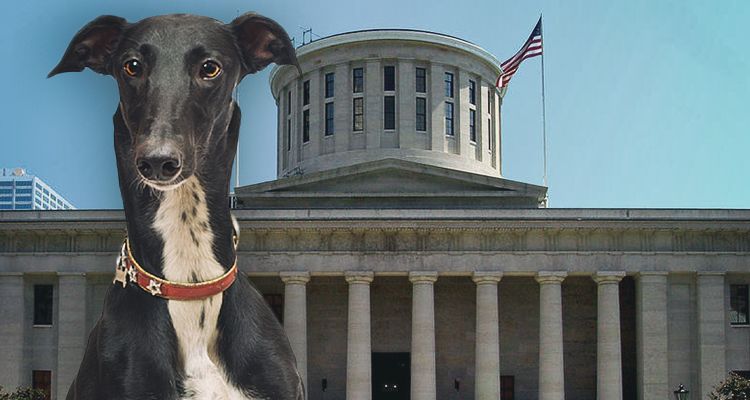As a long continuing trend across the country and throughout the world plays out, West Virginia could be the next U.S. state to end greyhound racing without actually banning the animal sport.
As part of the Republican-backed state budget, greyhound racing and the state’s video lottery gaming could be decoupled. Race dog breeders would no longer receive part of the revenues generated by the lucrative slot machines, even though the video lottery terminals were originally approved on that condition.
According to reports by local news outlets, the dogs have been racing in Wheeling, West Virginia more than 40 years, while our research finds the first facility in Wheeling opening in 1866 with greyhounds introduced to the track in August 1976. By the summer of 1984 “Wheeling Downs” was in the top 3 or 4 tracks of 42 then operational in the country.
Now dog racing is illegal in 40 states, while all tracks have closed in four more states due to other pressures. Currently, only West Virginia, Florida, Alabama, Arkansas, Texas, and Iowa have legal, active tracks. Arizona was the last state to outlaw dog racing in 2016. Since 2001 thirty tracks have ended racing and most have closed altogether.
From a practical standpoint, nobody expects the state’s race tracks to survive if breeders no longer receive a portion of slot losses. From an economic standpoint proponents of Senate Bill 4-37 say the measure would save the state about $15 million per year.
Opponents of the bill say its passage would close every kennel in the state and eliminate as many 1,700 jobs. With no tracks to race at there could also be as many as 6,000 dogs in need of adoption.
Other states, including Florida, have struggled with the possibility of parimutuel betting tracks, dogs and horses, being decoupled from the gambling machines that made their way onto the scene as a way to create and maintain jobs in the racing industry.
The Florida Thoroughbred Breeders’ and Owners’ Association CEO & Executive V.P., Lonny Powell said of the potential there, “In a nutshell, decoupling means a race track in Florida would have the option of dropping all or most of its live racing while still keeping (or expanding) its slots and poker room facilities and seeking authorization for future gaming products from the Florida Legislature.”
In late 2015, Spectrum Gaming released an updated report detailing the decline in attendance at Wheeling from 929,000 in 1983 to only 13,000 in 2013. The state Dept. of Revenue commissioned the report in order to get an independent and objective analysis of whether sharing video lottery revenue with racetracks made economic sense.
The study showed that purse supplements had risen to 95%, whereas prizes were once entirely created from betting handle on the dogs. At one track the purses were also going to out of state residents at a ratio of 230:30.
Following is a portion of a World Casino News report on the study first published in 2015:
In 2014 the state was approaching an overall loss for the first time with oversight costs projected at $965,000 and race-related revenues to the state projected at $1 million. The report also showed that overall economic impacts of the greyhound industry barely exceeded subsidies.
Although none of the analyst’s recommendations included eliminating greyhound racing outright, their final recommendation did suggest that if the Legislature decides to eliminate racing, a small portion of the tax on gross gaming revenue from West Virginia video lottery casinos that currently goes into purse subsidies could be used to compensate those in the industry who would be harmed by a cessation of racing.
Industry insiders note that greyhound racing employs many people and their hopes are that legislators will not abandon the sport.
Currently, 39 states and the territory of Guam have outlawed greyhound racing, and four more states don’t have active tracks. Colorado was the most recent state to ban the practice with a law in 2014. Only six states other than West Virginia allow greyhound racing and have active tracks.



